- Home
- Lisi Harrison
Monster High 01 - Monster High Page 3
Monster High 01 - Monster High Read online
Page 3
“Cute,” Melody muttered, trying not to sound the least bit envious. “Hey, wanna walk into town and get some bagels or something? I’m starving.”
“Not until you admit that my room rocks and you’re jealous.” Candace folded her arms across her chest.
“No way.”
Candace turned toward her window in protest. “Um, how about now?” She blew a fog circle with her breath and then finger-drew a heart inside.
Melody proceeded with caution. “Is this some kind of setup?”
“You wish,” Candace said, eyeing the bare-chested boy in the garden across the street.
He was watering the yellow roses in front of a white cottage, wielding the hose like a sword. Lean back muscles undulated every time he thrust forward to joust. His worn jeans had slipped just enough to reveal the elastic band on his striped boxers.
“Is that the gardener, or do you think he lives there?” Melody asked.
“Lives there,” Candace said with certainty. “If he was a gardener, he’d be tanned. Tie me.”
“Huh?”
Melody turned to find her sister dressed in a purple, black, and silver zigzagged Missoni jumpsuit, holding the halter straps behind her head.
“How did you find that?” Melody asked, tying a perfect bow. “The wardrobe boxes are still on the truck.”
“I knew Mom would give it to me if I kept complaining, so I snuck it in my bag before we left.”
“So all of that stuff in the car was an act?” Melody’s heart began to trot.
“Pretty much.” Candace shrugged casually. “I’ll make friends and meet guys wherever. Besides, I need to keep my grades up this year if I want to get into a good college. And we all know that wasn’t gonna happen senior year in Cali.”
Melody wasn’t sure whether she wanted to hug her sister or hit her. But there wasn’t time for either.
Candace had already slipped on a pair of Glory’s silver platform sandals and scuttled back to the window. “Now, who’s ready to meet the neighbors?”
“Candace, don’t!” Melody begged, but her sister was already struggling with the iron latch. Trying to tame Candace was like trying to stop a moving roller coaster by waving your hands in the air. It was an exhausting waste of time.
“Hey, Hot Stuff!” Candace shouted out the window, then ducked below the ledge.
The boy turned and looked up, sheltering his eyes from the sun.
Candace lifted her head and peeked. “Nope. Not interested,” she muttered. “Too young. Four eyes. No tan. You can have him.”
Melody wanted to shout “I don’t need you to tell me who I can and can’t have!” But there was a shirtless boy with black-framed glasses and a mop of brown hair staring at her. All she could do was stare back and wonder what color his eyes were.
He waved awkwardly, but Melody remained frozen. Maybe he’d assume she was one of those life-size cardboard cutouts in the lobby of the movie theater and not a really socially awkward girl who was about to kick her sister in the shin.
“Ouch!” Candace wailed, grabbing her shin.
Melody moved away from the window. “I can’t believe you did that to me,” she whisper-shouted.
“Well it’s not like you were going to do anything,” Candace insisted, her blue-green eyes widening from the strength of her own conviction.
“Why would I? I don’t even know him.” Melody leaned against the bumpy log wall and lowered her head in her hands.
“So?”
“Sooooo, I’m tired of people thinking I’m a freak. I know you can’t relate to that but—”
“Get over it already, will ya?” Candace stood. “You’re not Smellody anymore. You’re pretty. You can get hot guys now. Tanned ones with good vision. Not geeky hose jousters.” She shut the window. “Don’t you ever want to use your lips as something other than veneer protectors?”
Melody felt a familiar pinch behind her eyes. Her throat dried. Her mouth twitched. Her eyes burned. And then they came. Like salty little paratroopers, tears descended en masse. She hated that Candace thought she had never made out with a boy. But how could she convince a seventeen-year-old with more dates than a fruitcake that Randy the Starbucks cashier (aka Scarbucks, because of his acne scars) was a great kisser? She couldn’t.
“It’s not that simple, okay?” Melody kept her tear-soaked face hidden. “Being pretty is your dream. Singing was mine. And it’s over.”
“So live my dream for a while.” Candace swiped gloss across her lips. “It’s more fun than feeling sorry for yourself, that’s for sure.”
How could Melody possibly explain her feelings to Candace when she barely understood them herself? “My pretty is fake, Candace. It was engineered. It’s not even me.”
Candace rolled her eyes.
“How would you feel if you got an A on a test that you copied off someone?” Melody asked, trying another tactic.
“Depends,” Candace said. “Did I get caught?”
Melody lifted her head and laughed. A giant snot bubble burst on her nose, which she quickly wiped on her jeans before her sister could see.
“You think about this stuff too much.” Candace swung her purse over her shoulder and then glanced down at her cleavage. “I’ve never looked better.” She held out her hand and pulled Melody to her feet. “It’s time to teach the good people of Salem the difference between Carhartt and couture.” After a quick scan of Melody’s sweaty gray Hanes T-shirt and baggy jeans, she added, “Just let me do all the talking.”
“I always do.” Melody sighed.
CHAPTER FOUR
MINT CONDITION
Frankie jumped to her bare feet and began dancing to the Lady Gaga beats lingering inside her head.
“So you’re okay with going to school?” Viveka’s spidery black lashes fluttered with disbelief.
“Completely!” Frankie swung her hands above her head and snap-twirled. “I get to make friends! I get to meet boys! I get to sit in a cafeteria! I get to go outside and—”
“Hold on a minute,” Viktor interrupted, serious as science. “It’s not that simple.”
“You’re right!” Frankie bolted toward her sky-blue wardrobe; the one tagged SKIRTS AND DRESSES in fuchsia spray paint. “What am I going to wear?”
“This.” Viktor leaned forward, placed the leather duffel at her feet, and then quickly backed away, as if offering a side salad to a hungry lion.
Instantly, Frankie changed course and headed toward the bag. It was so like her parents to get her a first-day-of-school outfit. Is it the pleated bebe mini with the black cashmere tank? Oh, please make it the pleated bebe mini with the black cashmere tank. Ohpleaseohpleaseohpleaseohpleaseohplease!
She unzipped the bag and reached inside, feeling around for the soft straps and cute oversize pin that held the kilt closed.
“Ouch!” She pulled her hand out of the bag as though it had teeth. “What was that?” she asked, still reeling from brushing up against the coarse object inside.
“It’s a sharp wool pantsuit.” Viveka gathered her hair and flung it over one shoulder.
“Sharp is right!” Frankie countered. “It feels like a cheese grater.”
“It’s darling,” Viveka pressed. “Try it on.”
Frankie turned the bag upside down to avoid touching the abrasive garment. A large chocolate-brown makeup case plopped onto the rug. “What’s that?”
“Makeup,” Viktor declared.
“From Sephora?” Frankie asked hopefully, giving her parents the chance to redeem themselves.
“No.” Viktor ran a hand over the comb tracks in his slicked-back hair. “From New York City. It’s a wonderful line of stage makeup called Fierce & Flawless, meant to hold up under the brightest theater lights on Broadway. Yet, it’s not too heavy.” Viktor pulled a soap-filled pad from the bag and scrubbed his forearm. A pinkish-yellow smudge was on the pad. A green streak was on his arm.
Frankie gasped. “You have mint skin too?”
“So do
I.” Viveka scrubbed a similar streak across her cheek.
“What?” Frankie’s hands sparked. “Have you always been mint?”
They nodded proudly.
“Then why do you cover it up?”
“Because”—Viktor wiped his finger on the leg of his tracksuit—“we live in a world of normies. And many of them are afraid of people who look different.”
“Different from what?” Frankie wondered aloud.
Viktor looked down. “Different from them.”
“We are part of a very special group descended from what normies call monsters,” Viveka explained. “But we like to refer to ourselves as RADs.”
“Regular Attribute Dodgers,” Viktor clarified.
Frankie reached for her neck stitches.
“Don’t pull!” her parents said together.
Frankie lowered her hand and sighed. “Has it always been like this?”
“Not always.” Viktor stood. He began to pace. “Unfortunately, our history, like that of so many others, is full of periods of persecution. But we had finally moved beyond the Middle Ages and were living openly among the normies. We worked together, socialized together, and fell in love with each other. But in the 1920s and ’30s, all that changed.”
“Why?” Frankie crawled onto the couch and snuggled up to Viveka. The smell of her mother’s gardenia body oil comforted her.
“Horror movies took off. RADs were being cast to star in all kinds of films, like Dracula, Phantom of the Opera, Dr. Jekyll and Mr. Hyde. And the ones who couldn’t act—”
“Like your grandpa Vic,” Viveka teased.
“Yes, like dear old Victor Frankenstein.” He chuckled, recalling a memory. “He had a problem memorizing his lines and, truth be told, he was quite stiff. So he was portrayed by a normie actor named Boris Karloff.”
“Sounds fun.” Frankie twirled her finger around the silky tie on her robe, wishing she had been alive back then.
“It was.” Viktor stopped pacing and looked straight at her, his grin fading like dusk. “Until the movies were released.”
“Why?” Frankie asked.
“They portrayed us as horrifying, evil, bloodsucking enemies of the people.” Viktor paced again. “Normie children screamed in terror when they saw us. Their parents stopped inviting us into their homes. And no one would do business with us. We became outcasts overnight. RADs experienced violence and vandalism. Our life as we knew it was over.”
“Didn’t anyone fight back?” Frankie asked, recalling the many historical battles waged for similar reasons.
“We tried.” Viktor shook his head, mourning the failed attempt. “Protests were pointless. They turned into frenzied autograph sessions for fearless horror fans. And any action stronger than a protest would have made us look like the angry beasts the normies feared we were.”
“So what did everyone do?” Frankie curled up closer to her mother.
“A secret alert was sent out to all the RADs urging them to leave their homes and businesses and meet up in Salem, where the witches lived. The hope was that the witches would identify with our struggles and take us in. Together we could form a new community and start fresh.”
“But didn’t the Salem witch trials get rid of all the witches, in like, 1692? And wasn’t this the 1930s?” Frankie asked.
Viktor clapped his hands once and then pointed at his daughter like an effusive game show host. “That’s right!” he gushed, taking pride in his daughter’s implanted book smarts.
Viveka kissed Frankie’s head. “Too bad the brainless zombie who sent the alert wasn’t as smart as you.”
“Yeah.” Viktor smoothed his hair. “Not only were the witches long gone, but he got the wrong Salem. He was thinking of Salem, Massachusetts, but he gave the coordinates for Salem, Oregon. All the RADs realized his mistake, but there was no time to change course. They had to get out before they were rounded up and thrown in jail.
“When they arrived in Oregon, they decided to just make the best of it. They pooled their money, disguised themselves as normies, built Radcliffe Way, and vowed to protect one another. The hope is that someday we’ll be able to live openly again, but until that time comes, it’s crucial that we blend in. Being discovered would force us into exile again. Our homes, careers, and lifestyles would be destroyed.”
“That’s why it’s important that you cover your skin and hide your bolts and seams,” Viveka explained.
“Where are yours?” Frankie asked.
Viveka lifted her black scarf and winked. Two shiny bolts winked back.
Viktor unzipped the high collar on his track jacket, revealing his hardware.
“Voltage,” Frankie whispered, awestruck.
“I’m going to get breakfast started.” Viveka stood and smoothed the wrinkles in her dress. “The makeup comes with an instructional DVD,” she explained. “You should start practicing now.”
Her parents each kissed her on the forehead and then started to close the door behind them.
Viveka peeked back in. “Remember,” she said, “you want to have this down by the time school starts.” Then she gently shut the door.
“Okay.” Frankie smiled, remembering that this downer of a conversation had begun on a total high. She was going to school!
Frankie flexed her toes and kicked away an unsightly pile of wool clothing as if it were a dead squirrel. No one was wearing wool pantsuits this season, she thought, as the itchy offenders skittered out of her line of vision.
Just to be certain, she consulted Teen Vogue’s back-to-school issue. As she had suspected, this year was all about light fabrics, jewel tones, and animal prints. Scarves and chunky jewelry were the must-have accessories. Wool was so out, it didn’t even make the “out” list.
The articles were extremely eye-opening. Not just in Teen Vogue but in Seventeen and CosmoGirl as well. They all were about being yourself, staying natural, loving your body as is, and going green! The messages were the exact opposite of Vik and Viv’s.
Hmmmm.
Frankie turned to face the full-length mirror that was propped up against the yellow wardrobe. She opened her robe and examined her body. Fit, muscular, and exquisitely proportioned, she agreed with the magazines. So what if her skin was mint? Or her limbs were attached with seams? According to the magazines, which were—no offense!—way more in touch with the times than her parents were, she was supposed to love her body just the way it was. And she did! Therefore, if the normies read magazines (which obviously they did, because they were in them), then they would love her too. Natural was in.
Besides, she was Daddy’s perfect little girl. And who didn’t love perfect?
CHAPTER FIVE
THE PICKUP ARTIST
Despite the early hour, Melody and Candace took to Radcliffe Way with the boundless energy of two girls who had been cooped up in an SUV for fourteen hours. Surprisingly, their new neighborhood was abuzz with activity. At the end of the street kids circled the cul-de-sac on their bikes, and a few doors down an entire family of jocks was playing football in the front yard.
“Is that one family?” Melody asked as they approached the cavernous stone house, where no fewer than ten boys were charging the shaggy-haired hottie with the ball.
“The parents must have had multiples,” Candace noted while fluffing her hair.
Suddenly, the game slowed, and then stopped, while the pack watched the Carver sisters stroll by.
“Why is everyone staring at us?” Melody mumbled from the side of her mouth.
“Get used to it,” Candace mumbled back. “People stare when you’re pretty.” She smile-waved at the high school–age boys, each with his own adorable mess of shaggy brown hair and a maybe-it’s-Maybelline cheek flush. Smoke from their Hummer-size grill circulated the tangy smell of barbecued ribs through the neighborhood at a time when most people hadn’t finished their first cup of coffee.
Melody gripped her hollow stomach. Dinner for breakfast sounded great right about now.
&
nbsp; “I loved you in last month’s J.Crew catalog,” Candace called out.
The boys exchanged confused looks.
“Candace!” Melody smacked her sister’s arm.
“Have some fun, will ya?” Candace laughed, clicking along the pavement in her mother’s silver platforms.
“Everyone we pass looks at us like we’re from another planet.”
“We are.” Candace tightened the neck straps on her Missoni jumpsuit.
“Maybe it’s because you’re wearing Saturday night on a Sunday morning.”
“I’m pretty sure it’s because you’re wearing yesterday’s road trip today,” Candace snapped. “Nothing says make new friends like a sweaty gray Hanes T-shirt and baggy jeans.”
Melody considered retaliating but didn’t bother. It wouldn’t change anything. Candace would always believe that good looks were a skeleton key for success. And Melody would always hope that people were deeper than that.
They walked along the rest of Radcliffe Way in silence. The winding road cut through some kind of forest or ravine—the homes on both sides had grassy front yards and dense, woodsy thickets for backyards. But that’s where the similarities ended. Like the uniquely marked logs in the Carver cabin, each house had defining features that made it individual.
A gray concrete slab in the cul-de-sac was fenced in by an unsightly tangle of electrical wires and phone lines. An old Victorian was completely shaded under a canopy of big-leaf maples and had an endless flurry of propeller-like seeds that helicoptered to the mossy ground. A black-bottomed swimming pool and dozens of mini sea-creature fountains provided tons of fun for everyone at No. 9. Even though the sun was tucked away under a duvet of silver-colored clouds, the neighbors were out swimming, splashing around like a school of playful dolphins.
It was becoming more and more evident that Salem was a town that celebrated individuality, a real live-and-let-live kind of place. Melody felt a gut punch of regret. Her old nose would have fit in here.
“Look!” She pointed at the multicolored car whizzing by. Its black doors were from a Mercedes coupe, the white hood from a BMW; the silver trunk was Jaguar, the red convertible top was Lexus, the whitewall tires were Bentley, the sound system Bose, and the music was classical. A hood ornament from each model dangled from the rearview mirror. Its license plate appropriately read MUTT.

 Crush Stuff.
Crush Stuff. girl stuff.
girl stuff.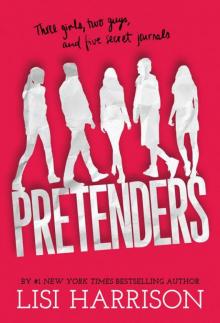 Pretenders
Pretenders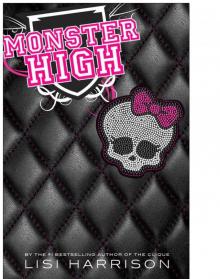 Monster High 01 - Monster High
Monster High 01 - Monster High Monster High 3: Where There's a Wolf, There's a Way
Monster High 3: Where There's a Wolf, There's a Way Massie
Massie Dial L for Loser
Dial L for Loser Top of the Feud Chain
Top of the Feud Chain Cliquetionary: The Wit and Wisdom of the Clique
Cliquetionary: The Wit and Wisdom of the Clique Boys R Us
Boys R Us Claire
Claire Revenge of the Wannabes
Revenge of the Wannabes Monster High 4: Back and Deader Than Ever
Monster High 4: Back and Deader Than Ever Best Friends for Never
Best Friends for Never The Clique: Charmed and Dangerous
The Clique: Charmed and Dangerous It's Not Easy Being Mean
It's Not Easy Being Mean Dylan
Dylan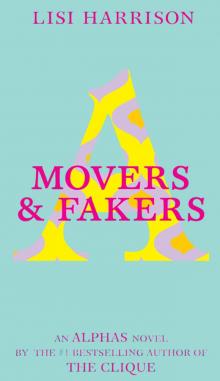 Movers and Fakers
Movers and Fakers Sealed with a Diss
Sealed with a Diss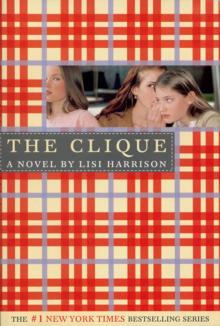 The Clique
The Clique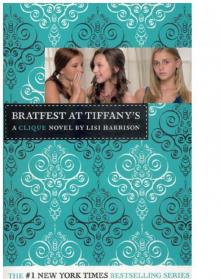 Bratfest at Tiffany's
Bratfest at Tiffany's A Tale of Two Pretties
A Tale of Two Pretties Alicia
Alicia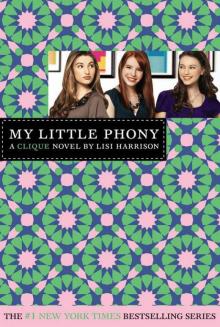 My Little Phony - 13
My Little Phony - 13 The Ghoul Next Door
The Ghoul Next Door Alphas
Alphas Belle of the Brawl
Belle of the Brawl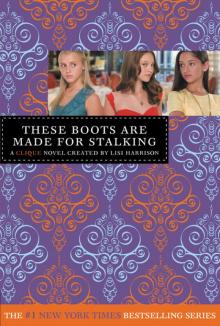 These Boots Are Made for Stalking
These Boots Are Made for Stalking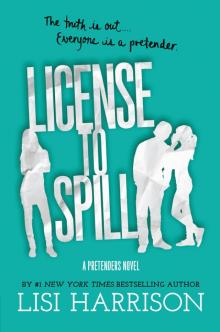 License to Spill
License to Spill Alphas #1
Alphas #1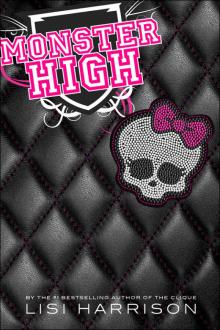 Monster High
Monster High Invasion of the Boy Snatchers
Invasion of the Boy Snatchers The Dirty Book Club
The Dirty Book Club The Pretty Committee Strikes Back
The Pretty Committee Strikes Back